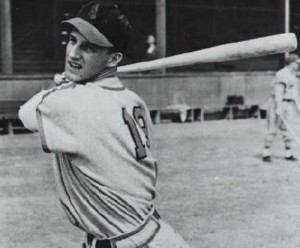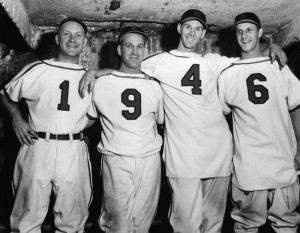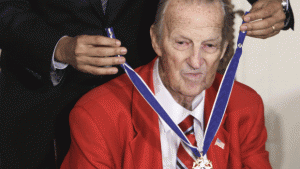70 Years Ago: Stan “The Man” Musial Begins His Remarkable Career

Stan Musial was 20-years-old when he made his debut for the St. Louis Cardinals on September 17, 1941.
It was 70 years ago today that one of the magical careers in Major League baseball history had its genesis during the second game of a doubleheader between the Boston Braves and St. Louis Cardinals. A rail-thin 20-year-old left-handed hitter named Stan Musial gave a hint of what was to come by two hits, including a double, and driving home two runs in a 3-2 Cardinals victory.
In hindsight, it is fitting that one of the greatest players in baseball history made his debut during the magical 1941 season.
In the months before Pearl Harbor and America’s entrance into World War II, the country was fixated on baseball and captivated by a pair of stars who were doing magical things with a bat.
Joe DiMaggio of the New York Yankees parlayed a record 56-game hitting streak into the MVP season. Ted Williams “The Splendid Splinter” ran away with baseball’s batting crown with a .406 average. No one could have predicted that 70 years later both records would remain unmatched across the annals of baseball.
Musial’s major league debut came barely a year after it was feared his career might be over before it started. Originally signed from his hometown of Denora, Pennsylvania as a pitcher and outfielder, Musial was playing for Daytona in the Florida State League when he jammed his left shoulder diving for a ball and was no longer able to pitch. However, little more than a year later he was thrust into a playoff race as a late-season call-up of the Cardinals.
When Musial made his debut, the Cardinals were on their way to an impressive 97-56 record, but were a game behind the first place Brooklyn Dodgers. They went 7-5 in the final 12 games, with Musial playing in all 12, and ended the season 2.5 games behind the Dodgers and their 100-54 record.
But it certainly wasn’t Musial’s fault that the Cardinals couldn’t catch the Dodgers. The young outfielder showed glimpses of what was to come over the next 20+ years by hitting .426 with four doubles, a home run and seven RBI in 12 games.
As a rookie in 1942, Musial proved that his audition in 1941 had not been a fluke as he hit .315 with 72 RBI and 32 doubles as the Cardinals won the pennant and the World Series.
He won the first of his seven batting titles in 1943 and was named the NL MVP for the first time as the Cardinals again reached the World Series (they lost in five games to the Yankees).
After leading the Cardinals to another World Series title in 1944, Musial missed the entire 1945 season due to military service.

The Cardinals won their third World Series in a five year stretch in 1946. Included in the photo are Whitey Kurowki (#1), Enos Slaughter (#9), Marty Marion (#4) and Musial.
Returning anew in 1946 at the age of 25, Musial’s power numbers started to increase. He drove home 103 runs while blasting 50 doubles, 20 triples, a then career-high 16 home runs and hitting .365 to win his second MVP Award. The Cardinals also claimed their third World Series title in five years.
While Musial was just coming into his own as an offensive superstar, that would prove to be the high-water mark for the Cardinals as a team during his career. The Cardinals didn’t reach another World Series until the year after Musial retired.
For that reason, while he was establishing himself as the top offensive player in the National League, he didn’t always receive as much attention as many of the stars from the East Coast.
In 1948 Musial established career highs with a .376 batting average, 39 home runs and 131 RBI to narrowly miss the triple crown (he finished third in home runs). His career year resulted in his third MVP Award in five seasons.
Musial finished second in the MVP voting three straight years from 1949-51 and again in 1957, but never again claimed the award.
Throughout the 1950s, Musial was among baseball’s most consistent players. He hit better than .300 every season of his career until an uncharacteristic .255 average in 1959 (at the age of 38) and drove home 100 or more runs 10 times between 1946 and 1957.
In 1962, the 41-year-old Musial finished 10th in the NL MVP voting while hitting .330 with 19 home runs and 82 RBI. He retired the following season after being named an All-Star for the 20th straight season.
Musial finished his career with a .331 batting average and a then NL record 3,630 hits. He also blasted 475 home runs, 725 doubles (still third all-time) and drove home 1,951 runs (sixth all-time).
In the five decades since his retirement, there have been many great baseball players, but few who displayed the consistency and the enthusiasm of Musial. Even though he didn’t receive the same level of attention and notoriety as Williams and DiMaggio early in his career and then later that of players like Mickey Mantle, Jackie Robinson and Willie Mays, the fact that Musial crossed generations has helped his greatness endure well past his retirement.
Though the now 90-year-old Musial no longer regularly attends the Baseball Hall of Fame induction ceremony, for many years he treated fans with his special harmonica rendition of “Take Me Out To the Ball Game.”
He has often been celebrated by fans in St. Louis, including at the 2009 All-Star Game held at the new Busch Stadium. In 2011, he received the highest civilian honor in the United States as a recipient of the Medal of Freedom.
Though Sportsman’s Park, where Musial began his legendary career 70 years ago, is long gone, the memories of his greatness will never be forgotten.



Hi I am so delighted I found your web site, I really found you by error, while I was browsing on Bing for something else, Regardless I am here now and would just like to say thanks for a fantastic post and a all round exciting blog (I also love the theme/design), I don’t have time to browse it all at the moment but I have book-marked it and also included your RSS feeds, so when I have time I will be back to read more, Please do keep up the superb work.
I do enjoy the way you have presented this challenge plus it really does supply me personally a lot of fodder for consideration. Nevertheless, coming from everything that I have seen, I really wish when the remarks pile on that individuals stay on issue and in no way start upon a soap box involving some other news du jour. Anyway, thank you for this superb piece and while I do not really go along with the idea in totality, I respect the point of view.
After study a few of the blog posts on your web site now, and I truly like your manner of blogging. I bookmarked it to my bookmark website checklist and can be checking again soon. Pls take a look at my site as properly and let me know what you think.
usually articles a few very fascinating things like this particular. In case you’re a new comer to this site.
Hello there! I know this is somewhat off topic but I was wondering which blog platform are you using for this website? I’m getting tired of WordPress because I’ve had problems with hackers and I’m looking at options for another platform. I would be awesome if you could point me in the direction of a good platform.
Once I originally commented I clicked the -Notify me when new comments are added- checkbox and now each time a remark is added I get 4 emails with the same comment. Is there any approach you’ll be able to remove me from that service? Thanks! Las Vegas Dentist
I love cool T-Shirts from undisclosed places.
Howdy just wanted to give you a quick heads up and let you know a few of the images aren’t loading correctly. I’m not sure why but I think its a linking issue. I’ve tried it in two different web browsers and both show the same results.
Thank you for taking this website internet, my life time is more efficient nowadays . :).
I absolutely adore your content material on this website . I seem over each night and I ‘m proud to say that you obtained it!
I thought the title, “70 Years Ago: Stan “The Man†Musial Begins His Remarkable Career | Sports Then and Now” was a bit misleading. However, the content did not disappoint!
Oh my goodness! an amazing article dude. Thank you Nonetheless I’m experiencing concern with ur rss . Don’t know why Unable to subscribe to it. Is there anyone getting equivalent rss problem? Anyone who knows kindly respond. Thnkx
I thought this article, “70 Years Ago: Stan “The Man†Musial Begins His Remarkable Career | Sports Then and Now,” was about something else. Even so, great write up!
Gold parties will be fresh phenomenon, created even more common by the spike inside price ranges. The firm We have knowledge about is definitely Gold party LLC. Fundamentally, you’re hanging out with your mates for an evening plus offering you aren’t selling a person’s gold. Following stories regarding family members items, aged addicts, mother-in-laws, sisters, for those who promote you aren’t. The nighttime had been expressive, sugary and humorous : everything a woman loves that has a mixture or a couple of to be able to complete the look. When i laughed, My partner and i cried, When i agreed to apply coordinator the party.
Youre so cool! I dont suppose Ive read anything like this before. So nice to search out someone with some original thoughts on this subject. realy thank you for beginning this up. this website is something that’s wanted on the internet, somebody with a bit of originality. helpful job for bringing something new to the web!
nice writing, very interesting. I like it very much. I come acoss this writing by google search engine. I could visit your site daily and introduce it to my friends. Please keep it fresh. Keep on the good work. – A colleage student
Youre so cool! I dont suppose Ive read something like this before. So good to seek out anyone with some authentic ideas on this subject. realy thanks for starting this up. this website is one thing that is needed on the net, someone with a little bit originality. useful job for bringing one thing new to the web!
I definitely believed the phillies where gonna triumph against the Cardinals, I had $50 riding on this game.. losing the actual money is not really the biggest lost, it’s losing from the Cardinals (that i cannot stand to the bone) Well better good luck next time Greets Dave Loodgieter
fabulous writing, very resourceful. I like it in deed. I come acoss your website by ASK search engine. I will visit your site daily and share it to my gangs. Please keep it updated. Keep on the good work. – A colleage student
Hello! I could have sworn I’ve been to this blog before but after checking through some of the post I realized it’s new to me. Anyhow, I’m definitely glad I found it and I’ll be book-marking and checking back frequently!
An interesting dialogue is value comment. I believe that you need to write extra on this subject, it may not be a taboo subject but usually individuals are not sufficient to speak on such topics. To the next. Cheers
fabulous article, very resourceful. I like it in deed. I come acoss the blog by baidu search engine. I may visit your site daily and forward it to my schoolmates. Please keep it fresh. Keep on the good work. – A apple fun
I’m typically to running a blog and i actually admire your content. The article has really peaks my interest. I am going to bookmark your web site and maintain checking for brand new information.
I thought the title, “70 Years Ago: Stan “The Man†Musial Begins His Remarkable Career | Sports Then and Now” was a bit misleading. However, the content did not disappoint!
advertising and *********** with Adwords. Well I?m including this RSS to my email and can look out for much extra of your respective intriguing content. Make sure you update this again very soon..
I got what you mean ,bookmarked , very nice web site .
This blog has definitely changed my perspective on this subject. Theres no way I wouldve thought about it this way if I hadnt come across your weblog. All I was performing was cruising the web and I found your weblog and all of a sudden my views have changed. Good on you, man!
Excellent post. I used to be checking constantly this weblog and I’m inspired! Extremely helpful information specially the last phase I deal with such info a lot. I was looking for this certain info for a long time. Thanks and best of luck.
I deal with such info a lot. I was looking for this certain info for a long time. Thanks and best of luck.
It’s actually a great and useful piece of info. I am happy that you just shared this useful info with us. Please stay us up to date like this. Thank you for sharing.
When contemplating how the sandwich feels think about how it will feel both in your hands and in your mouth. Many people will add oil or butter to the surface of the bread before grilling. While this helps some with getting nice grill marks it also means that the sandwich will feel greasy when you pick it up. I prefer to eliminate the extra oil, not for health or flavor reasons, because I do not like the feel of a greasy sandwich. Do add some form of moisture to the interior of your sandwich. You want the crunch of the toasted bread to be balanced by softness inside the sandwich. A great option that many people never consider is vegetables. Grilled peppers, grilled zucchini and caramelized onions all add lots of moisture to a sandwich as well as plenty of flavors.
Ugh. I’m so annoyed! Men are disgusting! I hate them!
It?s really a great and useful piece of information. I am glad that you just shared this helpful info with us. Please keep us informed like this. Thank you for sharing.
you’ve got an awesome blog here! would you like to make some invite posts on my blog?
I’m typically to running a blog and i actually respect your content. The article has actually peaks my interest. I’m going to bookmark your site and maintain checking for brand new information.
Good information. Lucky me I found your site byy chance (stumbleupon).
I’ve saved it for later!
Also visit myy homepage – norton internet security 2014 crack
Hello There. I found your blog using msn. This is an extremely well written article.
I will make sure to bookmark it and come back to read more
of your useful info. Thanks for the post. I will certainly return.